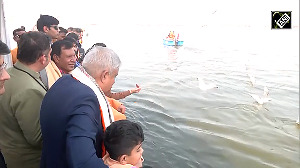Critical illness policies by life insurance companies provide a variety of combinations but have a complex fine print.
"Get back the entire money, even if you do not spend it," screams a hoarding while you are travelling on your way to office. Confused? - Yes, it is a new line which many life insurance companies are using to attract attention towards their critical illness policies.
Leading market players like LIC, Tata AIG, Bajaj Allianz and ICICI Prudential already have these products either woven in with other products or as standalone healthcare products.
How are these policies different from medical insurance policies, popularly known as mediclaim policies by public sector general insurance companies? Says Sujata Dutta, vice-president - health and accident, Tata AIG Life, "While general insurance companies work on the principle of reimbursement, life insurance companies work on the principle of benefits."
Adds Sam Ghosh, CEO, Bajaj Allianz Life, "Healthcare, hospitalisation care and CI policies of life insurers work on two simple principles of upfront payment of sum assured in case of CI and disability, and reimbursement in case of hospitalisation, surgery and post-hospitalisation care."
As a result, while under a simple mediclaim policy, you would be paid back the amount that you spend, under these policies you would be paid the entire amount that you have been covered for.
The catch - in some policies, you will have to live for some days (normally 30 days) after the CI to get the money. That is because life insurance companies can only give death benefits or survival benefits.
The way these policies work is not exactly simple. For starters there are options available where you get life insurance as well as critical illness cover. For instance, Bajaj Allianz Life has both critical illness and hospital cover as riders where you have to pay additional charges. "All benefits under these products can be claimed in addition to any other mediclaim policy," adds Ghosh.
This basically means that you can claim all the benefits that should accrue to you via this policy whereas even if you have two medical policies, you cannot get double benefits.
Let us take a closer look at such CI covers. Tata AIG's Health First policy is a pure healthcare policy where you get Rs 500,000 (for four people) for a specified period of five years. The premium also stays the same for the term. "If there are no claims in the five years, then you can renew it without a new medical form," says Dutta.
The policy benefits include daily hospitalisation benefit, critical illness benefit, surgical benefit, post-hospitalisation benefit as well as death benefit, if you have not claimed the other four. The premiums are Rs 4,074 for four family members (if you are starting it at the age of 25) for health insurance benefits. And they go up to Rs 17,552 (for four people), if you enter at the age of 45 (See Tata AIG's Health First).
| TATA AIG'S HEALTH FIRST | ||
|
Benefit |
Min (rs) (1 person) |
Max (rs) 10 persons |
| Daily hospital benefit | 250 | 1,000 |
| Surgical Benefit | 12,500 | 1,25,000 |
| Critical unit cover | 1,250,00 | 1,250,000 |
| Post hospitalisation benefit | 125 | 1,250 |
| Death Benefit | 1,000 | 1,00,00 |
| Life time benefit | 25,000 | 2,50,000 |
A normal medical policy would give you a cover of Rs 300,000 for four people for the premium of Rs 4,080, if you are under the age of 45. But the number of illnesses covered under this are many more.
In Tata AIG's Health Protector policy, the critical illness is a part of the accident policy that includes total disability and accident death benefit. "In Heath Protector, one has the option of taking a combination of a term plan plus critical illness. Depending on the amount that you are insured for in each of them, the benefits would come accordingly," adds Dutta.
In other words, if one were to take a combination of say Rs 400,000 on accident and another Rs 600,000 on CI, one would have a death benefit of Rs 400,000 and if you suffer from CI and survive, you are entitled to a benefit of Rs 600,000.
Others like ICICI Prudential have Heath Assure and Health Assure Plus. Health Assure covers six critical illnesses and Health Assure Plus gives the insurer life insurance as well.
However, the main question is should you have critical insurance policies in your portfolio - most financial advisors feel that these policies could form a part of your portfolio but only if you already have a medical insurance policy.
Says Mukesh Dedhia, director Ghalla and Bhansali, "In the absence of critical illness policies in India, one is inclined to say that maybe one could have some exposure to such policies."
But he is clear about the fact that one should not get carried away and put all the money in such policies. 'DO NOT' close any of your medical policies for CI policies, recommends Dedhia. The reason being that many of these policies do not cover pre-existing illnesses.
Moreover, he prefers a simple mediclaim policy as it idoes not confusing matters. Financial experts also opine that the definitions are way too stringent. Sample this: "Total blindness is defined as total and permanent loss of sight in both eyes. Blindness that can be cured by medical and surgical procedure is excluded."
Also, as mentioned before, you have to survive for 30 days to get Rs 500,000 that you have been covered for. In case of your unfortunate demise, you get only Rs 1,000. And, there is a lot more of such fine print.
In short, treat these products as standalone policies that give you benefits if you were to suffer from any critical illness. But do not confuse them as a part of your medical insurance.






 © 2025
© 2025